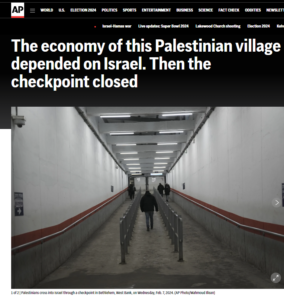 Prominent critics of Israel agree with Indyk. In the New Yorker, Rashid Khalidi wrote, “In Oslo and subsequent accords, the Israelis were careful to exclude provisions that might lead to a Palestinian political entity with actual sovereignty.” Palestinian statehood, he continued “are never mentioned in the text.” Avi Shlaim stated in the Guardian that the Accords “did not promise or even mention an independent Palestinian state at the end of the transition period,” and reiterated in the Journal of Palestine Studies that “The most basic criticism [of the Accords] was that the deal negotiated by Arafat did not carry the promise, let alone a guarantee, of an independent Palestinian state.” The State Department’s Office of the Historian recounts that under the terms of the Oslo Accords:
Prominent critics of Israel agree with Indyk. In the New Yorker, Rashid Khalidi wrote, “In Oslo and subsequent accords, the Israelis were careful to exclude provisions that might lead to a Palestinian political entity with actual sovereignty.” Palestinian statehood, he continued “are never mentioned in the text.” Avi Shlaim stated in the Guardian that the Accords “did not promise or even mention an independent Palestinian state at the end of the transition period,” and reiterated in the Journal of Palestine Studies that “The most basic criticism [of the Accords] was that the deal negotiated by Arafat did not carry the promise, let alone a guarantee, of an independent Palestinian state.” The State Department’s Office of the Historian recounts that under the terms of the Oslo Accords:
Israel accepted the PLO as the representative of the Palestinians, and the PLO renounced terrorism and recognized Israel’s right to exist in peace. Both sides agreed that a Palestinian Authority (PA) would be established and assume governing responsibilities in the West Bank and Gaza Strip over a five-year period. Then, permanent status talks on the issues of borders, refugees, and Jerusalem would be held.
The State Department history makes no mention of commitments, intentions or plans for a Palestinian state.
Writing in the New York Times, Henry Siegman, president emeritus of the US/Middle East Project and a past senior fellow at the Council on Foreign Relation, acknowledged: “The Oslo accords obligated Israel to engage in negotiations of ‘final status’ issues, but the accords provided no hint as to what Palestinians had a right to expect as the outcome of those negotiations. Indeed, the very term ‘Palestinian state’ did not appear in the accords.”
As an April 11, 2019 New York Times correction affirmed:
An earlier version of this article misstated a commitment of the Oslo accords, the 1993 agreement between the Israelis and Palestinians. The Oslo accords called for a negotiated settlement, but did not commit both sides to a two-state solution.
The Financial Times likewise corrected this point in 2019, and MSNBC issued a similar correction the following year.
Notwithstanding the facts, Frankel’s article about the economic hardships of West Bank Palestinians in face of the Israeli decision to ban entry to Palestinian workers following Hamas’ barbaric Oct. 7 bloodbath relentlessly advances the faulty narrative that the still stateless Palestinians are free of any responsibility for their current hardships. The tendentious headline — “The economy of this Palestinian village depended on Israel. Then the checkpoint closed” — sets the stage featuring singular Israeli culpability and the lack of Palestinian agency.
“They’ve been here centuries, far before the Palestinian family’s livelihood came to depend on the whims of Israeli occupation,” Frankel asserts in the opening paragraph, linking Palestinian welfare solely to the whims of Israeli occupation, and not the whims of Palestinians who carry out mass atrocities prompting Israeli measures to safeguard Israeli life.
Two paragraphs later, Frankel gives a perfunctory nod to the Hamas attacks which prompted the Israeli closure:
But the [parking] lot [from which the Massoud family had made a living] has been empty since Oct. 7, when Hamas militants attacked Israel from the Gaza Strip, and Israel, fearing more attacks, barred Palestinian workers from the West Bank from entering Israel.
But then she quickly redirects to the real culprit:
Israel’s campaign in Gaza has killed more than 28,000 Palestinians, unleashed an unimaginable humanitarian crisis and decimated the strip’s economy. But Israel’s near-complete severance of economic ties with the West Bank also has had serious repercussions for Palestinians there.
Quashing any potential doubt about who’s at fault for the economic hardship in Nilin and other West Bank villages, Frankel wrote: “The fallout from Israel’s decision is felt keenly in Nilin.”
The fallout from Israel’s decision. Not the fallout from Hamas’ decision to send thousands of terrorists into southern Israel, exploiting detailed information gathered by Palestinian workers so as to slaughter the coexistence minded Israeli employers and their entire families.
The economy of this Palestinian village depended on Israel. But then Hamas carried out horrific mass atrocities — murdering, torturing, wounds, kidnapping and traumatizing. That’s the real story. It’s just not AP’s.
